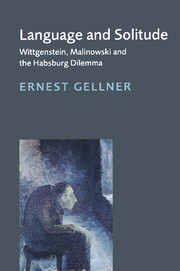Book contents
- Frontmatter
- Contents
- Preface
- Foreword
- Part I The Habsburg dilemma
- Part II Wittgenstein
- Part III Malinowski
- Part IV Influences
- Part V Conclusions
- 35 The truth of the matter
- 36 Our present condition
- General bibliography
- Bibliographies of Ernest Gellner's writings on Wittgenstein, Malinowski, and nationalism
- Index
35 - The truth of the matter
Published online by Cambridge University Press: 05 March 2010
- Frontmatter
- Contents
- Preface
- Foreword
- Part I The Habsburg dilemma
- Part II Wittgenstein
- Part III Malinowski
- Part IV Influences
- Part V Conclusions
- 35 The truth of the matter
- 36 Our present condition
- General bibliography
- Bibliographies of Ernest Gellner's writings on Wittgenstein, Malinowski, and nationalism
- Index
Summary
Our beginning lay in the two visions of knowledge, and indeed of man, society, everything. This polarity, and the tension between its two poles, is one of the deepest and most pervasive themes in modern thought. On the one hand, there is atomistic individualism, which sees the individual building his cognitive world (and indeed any other) by orderly, step-by-step, individual effort, possibly maintaining cooperative relationships with others similarly engaged, but without this fundamentally affecting the nature of the enterprise, which in the end is solitary. The individual and his judgement are in the end sovereign and in assessing claims, he practises atomism; he subdivides cultural packagedeals so as to assess their merits. Self-sufficiency and atomism are his deepest principles.
On the other hand, there is romantic organicism, which sees the community, or the ongoing tradition as the real unit, transcending the individual, who only finds the possibility of fulfilment and creativity and thought, even or especially of identity itself, within that community.
Each of these visions has been articulated in many fields other than that of knowledge, even if knowledge is possibly the most important. For instance, each of the two poles has its own conception of economic life. In modern times, political attitudes have most often been classified in terms of their stance on this issue. The individualist sees the polity as a contractual, functional convenience, a device of the participants in the pursuit of mutual advantage, and one to be subjected to cost-benefit accountancy and required to pay its way.
- Type
- Chapter
- Information
- Language and SolitudeWittgenstein, Malinowski and the Habsburg Dilemma, pp. 181 - 188Publisher: Cambridge University PressPrint publication year: 1998



